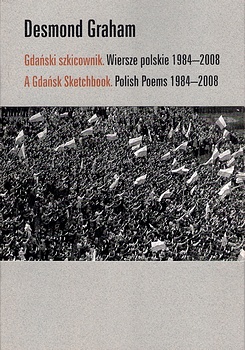A Gdańsk Sketchbook. Polish Poems 1984-2008
A bi-lingual edition, published by the European Centre for Solidarity ‘for the twentieth anniversary of the Polish Round Table negotiations in 1989, the symbol of the fundamental transformation which was to encompass Central Europe’. The poems are selected, edited and translated by Olga and Wojciech Kubiński, Gdańsk, 2009.
from the Preface by Olga Kubińska:
‘This collection of poems constitutes a veritable chronicle of the last twenty five years of the history of Poland. Graham accurately sketches encountered images, scenes, conversations and events. Avoiding hasty conclusions he builds up a mimetic and at the same time metaphorical representation of Poland. The narration of Graham’s poems involves the creation of patches of light and darkness, the negotiation of grey spaces, skilled movement through contradictions.’
from Graham’s Introduction:
‘Of course the poems are an outsider’s view. But they are made from what I heard, what was given to me over years by the most generous people imaginable.’
They are trying to bury a memory
they have a police-van stuffed with flowers
they take to the refuse heap and leave there
they have concrete paving to show nothing happened:
they put it in place where the flowers were.
Each morning the flowers pick themselves up
and disguised as people make their way
back into town. There they stretch out
on paving, tuck themselves behind crosses
and inscriptions, gather in heaps.
This is too much. With water-cannon
they are thrown across paving.
They are beaten with batons. Tanks
crush down every inch where a flower could grow.
The flowers are back under the ground.
In the morning, disguised as people,
they gather at the memorials and wait.
August 1989
We waited for the TV
to clear
the lines to be rid
of interference
the picture to move
just right
the black and white
so grey now
though this in colour
and the speeches
so long and the same
and we waited
the grey brown furniture
the stove in the corner
blocked out for summer
some dried flowers in front
and we waited
till he came and spoke
Mazowiecki
and he didn’t say
much
and the whole country
waited
held up
their glass
and held still
and the storks
in neighbouring fields
picked about
then stood bent over
quite still
and he spoke
and the world didn’t falter
they sky didn’t fall in
nothing happened
and that nothing
we knew
was the start
and what happened after
was never the same
at first
but totally else
